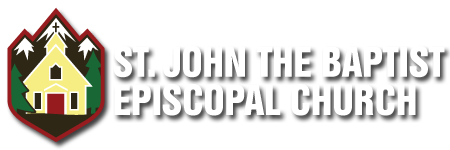St. John’s may not have had a better friend and champion during the “lean” years than Bishop Fred Ingley, whose birthday we celebrate today (November 20). After the gold rush but before the ski boom, St. John’s struggled to stay afloat. In those days, we had mostly temporary clergy, sporadic closures and a dwindling population (by 1930, only 436 people lived in Breckenridge). Charged with the care of mission congregations primarily on the western slope, Bishop Ingley earned the admiration of Colorado Episcopalians as he traversed the rough and winding roads across the state.
Born 20 November 1878 in Staffordshire, England, Fred Hingley (the family dropped the “h” upon emigration to the U.S.) was 9 years old when his family came to this country. They settled in Pittsburgh and, after schooling, young Fred went to work for the Pennsylvania Railroad. He married at 22 and became a father when Fred, Jr., came along. Tragically, his wife died of cancer two years later, leaving Fred a single father.
Fred’s life then took a dramatic turn. Instead of a career with the railroad, he entered seminary, reportedly without a high school diploma (according to family accounts) or college degree. Upon ordination, he served churches in Pennsylvania and then Wisconsin, where he married again and formed a family.
Fred ingley, Fourth Bishop of Colorado
Ingley came to Colorado in 1917 to serve as rector of St. Mark’s, Denver. Soon after that time, the diocese was in the process of re-integrating congregations across the western slope (including St. John’s) which had been broken out into a separate missionary district for almost 3 decades. After just four years in the diocese, Ingley was elected bishop coadjutor (successor) in 1921, primarily to oversee the church’s mission work in the state.
As coadjutor, now-Bishop Ingley journeyed across the Continental Divide from the front range to attend the needs of churches in mining, farming and ranching communities. He served Colorado congregations in places as far-flung as Durango, Saguache, Telluride and Walden.
According to our Parish Register, Bishop Ingley visited St. John’s an impressive 12 times between 1921 and 1948. Travel could not have been easy. Train access to the county was limited by the 1920s and Loveland Pass would not be paved until 1950. Reportedly, Bishop Ingley kept a journal of his visits to mission churches, a record which has sadly now been lost.
A bishop coadjutor assumes the role of diocesan bishop when the previous bishop resigns or dies. So after nearly 17 years as a “bridesmaid but never the bride,” Fred Ingley became the diocesan bishop in 1938. He served the church through the Depression and war years, as his native country was being devastated by Hitler’s ferocity. He resigned in 1949 and died two years later at the age of 73.
Bishop Ingley devoted his adult life to service of the church, with St. John’s as a beneficiary of his dedication. His kindly demeanor is evident in photographs, a marked difference from the stern countenance of some predecessors. He was also beloved by his family. His granddaughter, Margaret, now 85, fondly recalled her grandfather once taking her to lunch at the Brown Palace Hotel in Denver when she was a girl. “It was a treat to have butter rather than margarine,” Margaret says. “Grandfather had quite the twinkle in his eyes when we both bounced on plush chairs in the lobby.” Importantly, she remembers he emphatically called Colorado “God’s Country!”
In addition to his work with mission churches, Bishop Ingley was known for his commitment to college ministry and to advancing health care at two diocesan hospitals. He was awarded an honorary doctorate of divinity by Colorado College in 1928. At his memorial, he was remembered in this way:
As a preacher, he was simple and direct, and the burden of his preaching was the love of God and the responsibility of his people to reveal that love in the practical business of daily living. Most of all, however, we shall remember Bishop Ingley and miss him for one outstanding characteristic – his great love of souls, and his unfailing and deep concern for his responsibility as the chief shepherd of his flock.
From obituary in The Living Church, 25 February 1951


